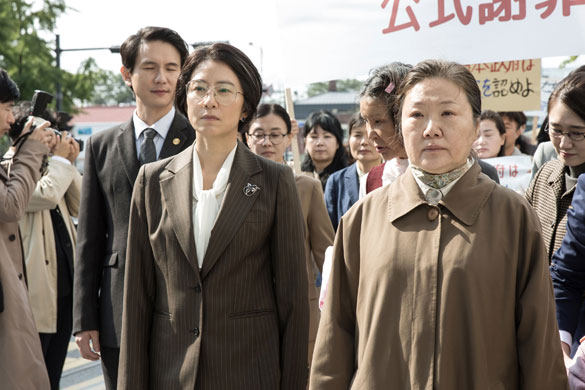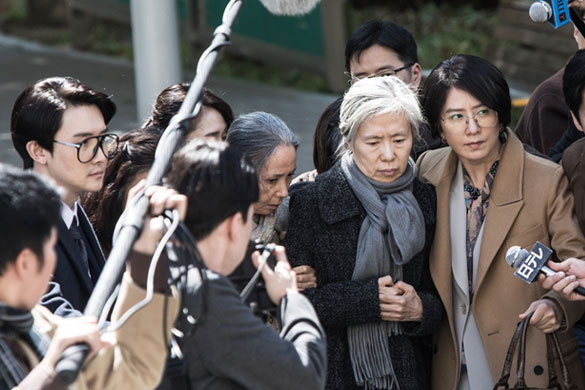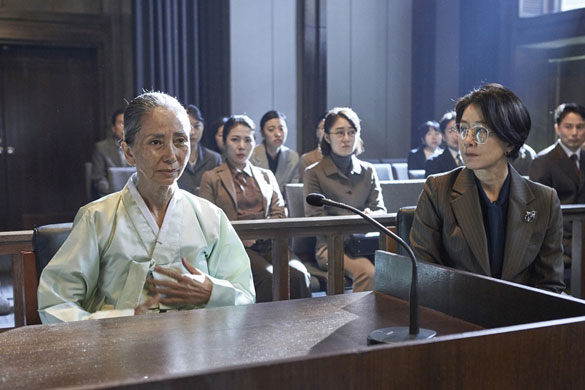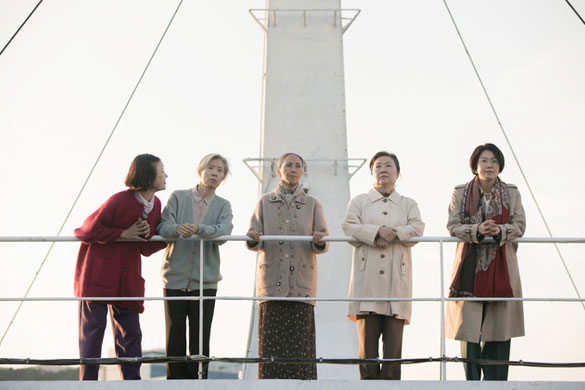"I was taken away at 17 and lived in hell. I'm still living in that hell...
Even if they give me all of Japan, I don't want it! There's only one thing that I want. Me!
Give me back my youth! Take me back to when I was 17!..."
Synopsis:
As the CEO of a Busan travel agency, Moon Jung-sook (Kim Hee-ae) is held responsible when police are informed that one of her employees has been running ‘prostitution tours’ as part of the services offered by the company, in spite of her having no prior knowledge of the illegal activity. At around the same time as Jung-sook is ordered to suspend trading for three months as a direct result, news headlines emerge of an elderly woman who has approached the media claiming she was abducted by the Japanese military in her youth and forced into sexual slavery during World War II. As Jung-sook’s business premises are forcibly empty, she and the other members of her Women’s Association decide to set up a call centre in an effort to give a voice to other elderly women who were also the victims of wartime Japanese sexual abuse.
Ever so gradually, a number of historic ‘comfort women’ bravely come forward and on hearing their heartbreaking memories of horrific abuse at the hands of the Japanese, complete with both physical and emotional scars, Jung-sook instantly realises that the Japanese government needs to be sued for financial compensation and, even more importantly, an official apology for the travesties suffered by these innocent, vulnerable women.
However, none of the women are aware of how protracted, involved and indeed traumatic undertaking such a task will be, with no guarantee that the comfort women’s plight will even be acknowledged as fact...
Review:
We’re introduced to Jung-sook during a communal restaurant meal with the other members of her women’s association, all of whom are successful businesswomen. The first of their over dinner discussions that we are party to sees Jung-sook chastising one of the others of the group for claiming her success was thanks to her husband rather than her own endeavours, the light-hearted, somewhat sarcastic response being “I am woman, hear me roar". If you consider the fact that the two time periods referenced in this true-life tale are the 90s (modern and present day Korea from the characters' perspectives) and the 40s during World War II with Korea under Japanese occupation, this brief exchange between the two businesswomen clearly points to how far the place of women in Korean society had moved forward since far more traditional pre-independence times when women were largely expected to prioritise marriage above career and subsequently put aside personal needs and desires in favour of serving the needs of husbands and family at all cost.
However, while this alongside further references to Jung-sook’s business savvy and indeed acumen points to a wholly positive societal shift in favour of female autonomy and even empowerment, the attitudes of a not insignificant number of (mostly male) individuals to the comfort women’s statements of horrific sexual abuse quite frankly scream of how far Korea still had to go in terms of perceptions and assumptions of anything sexually or morally related, forced or not. In spite of there being physical scars (to say the least) on these poor women’s bodies to back up their claims of violence within sexual slavery – and even crude inflicted tattoos reading ‘Joseon p*ssy’, and the like – some resolutely refuse to believe they were no more than prostitutes or that they went to the camps willingly knowing full well what would be required of them. These blinkered, uncaring accusers use Korea’s penchant for looking at anything sexual (in a non-marital sense) from a entirely negative perspective to justify instant accusations of promiscuity, a lack of morals and guilt; misplaced, inappropriate moral high ground making them unable, as they are, to understand the innocence and victimisation that was really at play within these women’s forced slavery.
Of course, the abhorrent treatment of these poor women (little more than children at the time) at the hands of the Japanese military was as horrifically shocking as it was heartbreaking but so too were the presumptions and accusations they far too routinely faced as elderly, frail and vulnerable females bravely coming forward to bring a light to the atrocities they had faced, knowing full well what those presumptions would too often be... and that’s without even mentioning their treatment during the hideously protracted, often cold and heartless trial.
 |
Over the years, a fair few Korean films have focused on the subject of comfort women and whether you consider ‘talking heads' interview documentaries such as 1995’s The Murmuring (the first in a trilogy of comfort women films by director Byun Young-joo, the subsequent instalments being Habitual Sadness (1997) and My Own Breathing (1999)); look at more recent true-life based films like Spirits' Homecoming (2016); or indeed fictionalised tales such as Snowy Road (2017), each could be said to have its own narrative methodology, if you will, be it solely dialogue-driven discussions of comfort women atrocities; narratives set in the present flashing back to the past; or tales with a wholly historical setting.
Virtually any other subject having so many film focused on it would bring a huge risk of a feeling of repetition but comfort women stories by their very nature being at the same time communal and individual (i.e. the subject overall and the various specific tales within it) ensures these separate movies can stand together as almost an ensemble piece, each extending and further detailing the numerous atrocities inflicted on these innocent women and in the process increasing viewer understanding of and indeed empathy for their terrible plight.
This is of course also the case for Herstory but the film’s focus on the trials in Japan (lasting almost a decade) as well as the comfort women’s testimonies (and indeed their preparations for court cross-examination) also allows for an in-depth look at the psychological scars they have suffered and how those emotional wounds have adversely affected not just their very lives but their every waking moment over the decades.
As such, though Herstory could be broadly described as a courtroom drama its emotional resonance is palpable and deeply poignant to the nth degree, helped yet further by superlative performances by a veteran A-list cast.
 |
As is the case in the vast majority of comfort women films, Herstory certainly pulls no punches in detailing the sheer level of awful abuse suffered by young women who have struggled to even keep on living into adulthood and elderly years as a direct result.
However, difficult though hearing their heartbreaking stories truly is, Min Kyu-dong's narrative deftly uses them to point to the women's resilience in the face of their absolute shame and guilt about something that was in no way their fault.
Not only that, but as the 1990s Japanese trials unfold and the women face a cynicism and lack of understanding that even they couldn't have envisioned, Herstory expertly and understatedly turns that resilience into depictions of female strength (brought both from coming forward as individuals and coming forward together as a group), expertly underlining at every turn just how extraordinary these women were and are.
Herstory has many strengths as a film but those depictions are, to my mind, what it should be most proud of, standing, as they do, as an absolute tribute to innocent, proud and brave women so terribly wronged.
 |
Summary:
Though those already aware of comfort women’s desperate struggles for acknowledgement, justice and apology will likely already know Herstory’s ultimate conclusion, with such an important subject that should be repeatedly told and never, ever forgotten the journey is equally important, for characters and viewers alike. As such, Herstory is an exemplary realisation of a deeply poignant true-life tale absolutely vital to public awareness of the comfort women’s plight, past through to present.
HERSTORY (허스토리 / 2018)
Director: Min Kyu-don
|





